Quentin Tarantino Django Unchained
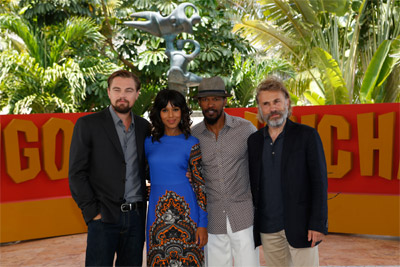
Django Unchained
Quentin Tarantino, Leonardo DiCaprio, Jamie Foxx, Christoph Waltz and Kerry Washington took part in a photo call at the "Summer of Sony" event in Mexico in April to promote their new film "Django Unchained".Cast: Leonardo DiCaprio, Jamie Foxx, Christoph Waltz, Kerry Washington
Director: Quentin Tarantino
Genre: Drama, Western
Synopsis: Set in the South two years before the Civil War, Django Unchained stars Academy Award®-winner Jamie Foxx as Django, a slave whose brutal history with his former owners lands him face-to-face with German-born bounty hunter Dr. King Schultz (Academy Award®-winner Christoph Waltz). Schultz is on the trail of the murderous Brittle brothers, and only Django can lead him to his bounty. The unorthodox Schultz acquires Django with a promise to free him upon the capture of the Brittles - dead or alive.
Success leads Schultz to free Django, though the two men choose not to go their separate ways. Instead, Schultz seeks out the South's most wanted criminals with Django by his side. Honing vital hunting skills, Django remains focused on one goal: finding and rescuing Broomhilda (Kerry Washington), the wife he lost to the slave trade long ago.
Django and Schultz's search ultimately leads them to Calvin Candie (Academy Award®-nominee Leonardo DiCaprio), the proprietor of "Candyland," an infamous plantation where slaves are groomed by trainer Ace Woody (Kurt Russell) to battle each other for sport. Exploring the compound under false pretenses, Django and Schultz arouse the suspicion of Stephen (Academy Award®-nominee Samuel L. Jackson), Candie's trusted house slave. Their moves are marked, and a treacherous organization closes in on them. If Django and Schultz are to escape with Broomhilda, they must choose between independence and solidarity, between sacrifice and survival.
Release Date: January 24th, 2013
About the Production
Django Unchained's journey to the big screen began over ten years ago, when writer-director Quentin Tarantino first thought of the film's main character, Django. "The initial germ of the whole idea was a slave who becomes a bounty hunter and then goes after overseers that are hiding out on plantations," Quentin Tarantino recalls. "I just started writing, and Django presented himself to me. At the beginning he just was who he was - the sixth slave from the seventh on a chain gang line. But he just kept revealing himself to me more and more as I wrote."Although Django Unchained takes place in the Antebellum South, Tarantino found that Django's story might best be represented as a Western. "I've always wanted to do a Western. I like all kinds of Westerns, but since Spaghetti Westerns have always been my favourite, I thought that the day I do one, it would be in that Sergio Corbucci universe," Quentin Tarantino says.
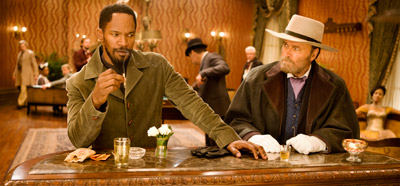 For Quentin Tarantino, Westerns represented grand, masterful depictions of good and evil. He found that the genre's scope and structure were fitting for this particular story of one man's struggle to infiltrate a notorious plantation in order to rescue his wife. "It can't be more nightmarish than it was in real life. It can't be more surrealistic than it was in real life. It can't be more outrageous than it was in real life," Quentin Tarantino explains. "It's unimaginable to think of the pain and the suffering that went on in this country, making it perfect for a Spaghetti Western interpretation. The reality fits into the biggest canvas that you could think of for this story."
For Quentin Tarantino, Westerns represented grand, masterful depictions of good and evil. He found that the genre's scope and structure were fitting for this particular story of one man's struggle to infiltrate a notorious plantation in order to rescue his wife. "It can't be more nightmarish than it was in real life. It can't be more surrealistic than it was in real life. It can't be more outrageous than it was in real life," Quentin Tarantino explains. "It's unimaginable to think of the pain and the suffering that went on in this country, making it perfect for a Spaghetti Western interpretation. The reality fits into the biggest canvas that you could think of for this story." Producer Reginald Hudlin agrees that the genre was an unconventional but appropriate fit. "The shifting moral tone, the dark corners, the moral complexity of both A Fistful of Dollars and the Corbucci films was a huge influence on Quentin Tarantino's storytelling. Quentin Tarantino's intense study of the genre led to the inspired idea of mashing up the slave narrative with the Spaghetti Western which creates a movie we have never seen before."
Shortly following the release of Inglourious Bastards Quentin Tarantino worked feverishly on the screenplay for Django Unchained. Christoph Waltz, an Academy Award-winner for Basterds, was present for much of the creative process. "I read the script as it was in the making," Christoph Waltz, who plays Dr. King Schultz, remembers. "It unfolded in front of me, more or less. I went up to Quentin Tarantino's house and he sat me at his table and put the pages in front of me and then watched me read it. It was a wonderful ritual. I was very touched that he would actually let me participate not in the genesis of the script, but in his train of thought."
As an early fan of the Spaghetti Western, Christoph Waltz took to the script's close connection to the genre. "The big time of the Spaghetti Western was really the time when I started to get interested in movies as a kid, the late 60s, and then early 70s, and onwards."
The name "Django" is familiar to fans of Spaghetti Westerns: Franco Nero first portrayed the character in 1966 in DJANGO. Franco Nero joined the production to make a cameo appearance in Django Unchained. "For us in Austria, 'Django' was a household name. Not necessarily Franco Nero, but 'Django.'" Christoph Waltz says. "Every Spaghetti Western that came out, even the obscurest ones, in the German version had 'Django' in their titles, even though there was no Django in the plot or in the story. They just put 'Django' in because Django really was the distilled key word, so to say, to name the genre. If it had 'Django' in it, you knew it was a Spaghetti Western."
"I like evoking the Django title for what it means to Spaghetti Westerns and that mythology," Quentin Tarantino says. "At the same time, there's a 40-film series of nonrelated DJANGO rip-off sequels that are their own spot of Spaghetti Western history. I'm proud to say that we are a new edition to the unrelated DJANGO rip-off sequels."
Indeed, the original DJANGO was so popular that other films borrowed the name as a marketing tool. The more imaginative titles include DJANGO, KILL; DJANGO THE AVENGER; VIVA! DJANGO, and BALLAD OF DJANGO, to name a few.
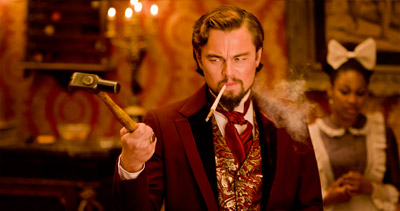 Quentin Tarantino completed his script on April 26, 2011 and began sharing it with friends and colleagues. As "publishing day" approached, the producers began gearing up for production. "As you hear Quentin Tarantino typing in his house, you're a couple months out, you start calling all the players. You call [Stunt Coordinator] Jeff Dashnaw, and you call [Sound Mixer] Mark Ulano, and you call [Makeup Department Head] Heba Thorisdottir, You call everybody and you say he's getting close. You try and keep everybody available because we're a family, we've all done so many movies together, and we love working together," producer Pilar Savone says.
Quentin Tarantino completed his script on April 26, 2011 and began sharing it with friends and colleagues. As "publishing day" approached, the producers began gearing up for production. "As you hear Quentin Tarantino typing in his house, you're a couple months out, you start calling all the players. You call [Stunt Coordinator] Jeff Dashnaw, and you call [Sound Mixer] Mark Ulano, and you call [Makeup Department Head] Heba Thorisdottir, You call everybody and you say he's getting close. You try and keep everybody available because we're a family, we've all done so many movies together, and we love working together," producer Pilar Savone says. The reaction to the script was overwhelming. Hudlin, for one, admired the script's unique and honest depiction of slavery in the years before the Civil War. "We have to remember not only the best of who we are, but the worst of who we are," Hudlin says. "And we're not going to appreciate the best of who we are until we see and celebrate the heroism of people who saw evil and faced it down. Even though these characters are fictional, they represent hundreds, if not more, of real men and women, Black, White, who stood up in the face of evil and said 'no.'"
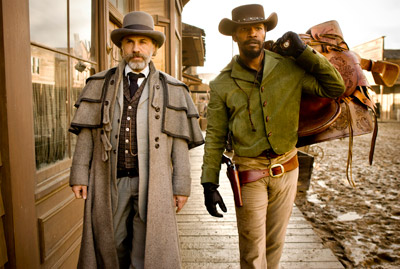 With the script in place, Quentin Tarantino set out to find the right actors for the ensemble. Jamie Foxx, an Academy Award winner for RAY, won the role of Django. "We got together and he was just terrific," Quentin Tarantino recalls. "He understood the story, the context of the story and the historical importance of the film. He got it 100%. He's a terrific actor and he looks perfect for the character, but there's a cowboy quality to him. When I met him, I was imagining that if they cast black guys in the 60s to be the stars of Western TV shows, I could imagine Jamie Foxx having his own TV show. He looks good on a horse, and good in the outfit."
With the script in place, Quentin Tarantino set out to find the right actors for the ensemble. Jamie Foxx, an Academy Award winner for RAY, won the role of Django. "We got together and he was just terrific," Quentin Tarantino recalls. "He understood the story, the context of the story and the historical importance of the film. He got it 100%. He's a terrific actor and he looks perfect for the character, but there's a cowboy quality to him. When I met him, I was imagining that if they cast black guys in the 60s to be the stars of Western TV shows, I could imagine Jamie Foxx having his own TV show. He looks good on a horse, and good in the outfit." Jamie Foxx responded to the script's honest portrayal of the brutality of slavery. "It was the most incredible script I've read in all of my life," Jamie Foxx says. "I thought, 'Who has the guts, and the knowledge to tell it like it really is?' I thought that the way he's telling the story - as true and as honest -- if it rips your flesh off, so be it. That's what was exciting about the process."
Jamie Foxx notes that Django and Broomhilda's devotion to each other allowed for a personal, intimate window into these characters. "Back at that time, to be married was taboo. You could be killed. They forced marriages back then - or they forced copulation - so the strongest buck would mate with the strongest black woman and they could get stronger slaves. They didn't want black people to be married. So Django being married was a big thing for me. This is a love story. And that's what fuels him. He's not trying to stop slavery. He's not trying to do anything but find the love of his life - which is like trying to find a needle in a world of haystacks."
"The reason that we tighten up because it was a bad place," Jamie Foxx continues. "It was a dangerous time, and we sometimes feel that it does hold us in captivity without the chains, metaphorically."
Kerry Washington, who took on the role of Broomhilda, also connected to the bond that exists between Broomhilda and Django. "The thing that most drew me to the project was this idea that in a time when so much of the world was committed to the idea that people of African decent were not human, that you could have this love story take place between these two human beings who love each other so much at a time when they couldn't legally be married on their own accord because they weren't even their own people. They were property. These two people find a way because of the power of their love to be together, and to honour their commitment of marriage to each other in this historical context. It's just so powerful."
Kerry Washington also saw a connection between Django Unchained and Quentin Tarantino's overall body of work. "He is not afraid of violence, and darkness, and the dark side of the soul," Kerry Washington says. "I think that you need someone who isn't afraid of those areas to be able to tell a story that takes place in this time. Because it is fundamentally a love story, you also need someone who believes in the goodness of human beings, and believes in love, and believes in beauty to be able to hold onto the love story in the space of all that evil and darkness and greed. I think it's amazing that he's able to hold both of those spaces."
"Love, rescue, transformation: that's the destination. That's the journey Quentin Tarantino has written for Jamie Foxx and Kerry Washington in this movie," producer Stacey Sher agrees.
Samuel L. Jackson, who starred for Quentin Tarantino in Pulp Fiction and Jackie Brown, explains that his interest in Django Unchained was twofold: "It's a piece of our history that generally gets sort of whitewashed or perfumed in a way that this film just doesn't do," Samuel L. Jackson says, adding, "It's always great to find a character on the inside of one of Quentin Tarantino's stories to wrap myself around."
Production began on November 28, 2011 at a familiar location for fans of the western genre: Melody Ranch, in Santa Clarita, California. Once owned by Gene Autry, the western town was used in countless classic movies and television series, including Stagecoach, High Noon and Gunsmoke.
Jamie Foxx and Christoph Waltz trained with stunt coordinator Jeff Dashnaw and horse wrangler Rusty Hendrickson for months prior to saddling up for the cameras. "I kind of relish it," Christoph Waltz says of his relationship with his equine companion. "They introduced me to an approach that is more than just riding. I really love the fact that if I do the right thing, the horse will understand. And if the horse doesn't understand it is more than likely because I didn't communicate clearly."
Clear communication and weeks of preparation were required when the production moved to Big Sky Ranch in Simi Valley, CA to film the sequence in which Spencer Bennett gathers a mob together to raid Schultz's wagon. Given the skill needed to pull off the elaborate sequence, Jeff Dashnaw brought in the most capable horsemen he could find, resulting in a multi-generational group of the most gifted stuntmen working today. "Their timing was impeccable," Jeff Dashnaw remembers. "We had kids from nineteen years old to fifty-five years old in that shot. It just kind of levelled everybody out. It was very satisfying because there was three different generations of stunt people there from grandsons, to sons, to fathers, they were all there."
"I think we had about thirty-five horses in that scene at one time," Rusty Hendrickson says. "And then we carry a core of twenty horses that are randomly in the film throughout, mixing and matching. Some horses are paired with three different actors that come and go."
Following their tenure at Melody Ranch and Big Sky, the production saddled up and relocated about two hundred miles north to Lone Pine, California, just outside of Death Valley. High Sierra, Bad Day At The Black Rock and The Ox-Bow Incidnet are just a few of the hundreds of films that used Lone Pine's Alabama Hills as a backdrop. Django (Jamie Foxx) and Schultz's (Christoph Waltz) first meeting was filmed in the stark woods of Independence, just north of Lone Pine.
James Russo and James Remar, who co-starred in The Cotton Club in 1983, enjoyed their brief reunion during the filming of Django Unchained's opening sequence. "It was a blast. We had a good time. The weather was definitely sub-zero up in Lone Pine. I think the elevation was about ten thousand feet. The winds were howling. They were very long night shoots, and I had the honor of lying on the freezing ground after getting shot," James Remar remembers.
Lone Pine was just cold enough to give the effect of the frigid temperatures Quentin Tarantino wanted to represent. "It was very, very important to Quentin Tarantino because he believes in the magic of effects being created without CGI. And the impact of movie magic on people. And so we'd go out to this place where we were going to shoot the opening scene of the movie, and there was a production assistant that checked to make sure that you could see your breath, that it was both cold enough, and moist enough so that you could see your breath," Stacey Sher remembers.
But they all went to Wyoming after that," James Remar notes. "I hear the cold of Lone Pine paled in comparison."
Due to a lack of snow in Mammoth, California, the production made a hasty relocation to Jackson, Wyoming, where the Grand Tetons provided the backdrop for the film's winter scenes. Production designer Michael Riva explained how the lack of snow proved serendipitous: "We had to disassemble the entire set, put it on a truck, and we shipped it to Wyoming. And it was beautiful. There were many locations that were really terrific, like steam rivers, hills with tons of snow, and elk preserves. It started to open up the picture. The picture became very large, and the scope became really grand."
"The move to Jackson Hole was serendipitous. Filming in Wyoming made this movie bigger in so many ways. It made Django's journey even more epic," Savone enthuses.
Leonardo DiCaprio, Samuel L. Jackson, Don Johnson, Walt Goggins, Dana Gourrier, Nichole Galicia and Laura Cayouette joined Django Unchained when the production made its way to a warmer location: New Orleans, Louisiana.
Christoph Waltz, for one, embraced his time in New Orleans. He comments: "I'm from an alpine region. The swamp and subtropical situation with not just the landscape and the plants, but the animals that live in it like turtles, alligators, snakes. It's really a trip."
Evergreen Plantation, a historic site about an hour outside of the city, doubled for Don Johnson's Bennett Manor.
"You can imagine it was quite a sight at that time - Django in a Little Lord Fauntleroy suit and Dr. Schultz riding on a wagon with a giant tooth with a gold filling on waggling back and forth. This is a sleepy plantation in Tennessee." Johnson says of the absurdity of the scenes that were shot at Evergreen.
Johnson was a welcome addition to the cast. Jamie Foxx, who portrayed Tubbs in Michael Mann's Miami Vice, revelled in working with the man who originated the role of Crocket. "It was like seeing something magical, like a unicorn. There's Don Johnson," Jamie Foxx muses. "He was great choice. He absolutely killed it, and none of these characters are quite likable in certain aspects because they're not supposed to be."
"Don is Southern, and that was really important to Quentin Tarantino," Stacey Sher says. "They've known each other for years. It was great because the production had him for great big chunks. He left, he came back. We were just always so thrilled when he'd come back to us."
Contrasting Don Johnson's white suit is one of the more bold costume choices in the film: Django's "Blue Boy" outfit. "Jamie Foxx loved the Blue Boy," costume designer Sharen Davis says. "At our first fitting, we were trying to work on his first change -- the hero costume, but he was so excited about blue boy. He was in character. He was Django thinking, 'Oh my gosh, I have new clothes for the first time in my life.' Seriously, you could barely get him out of he outfit. He just loved it."
The slave quarters seen in Django Unchained were also part of Evergreen. "You can't walk through those places and not shed tears and feel something," Jamie Foxx says of the experience of shooting on the plantation. "I took my three and a half and my eighteen year old children, and I let them walk through there. I said, 'This is where you come from.' That's where we needed to be so we could really get down into the story."
Following Django's showdown with the Brittle Brothers, the production moved to the Candyland exterior, overlooking Evergreen Plantation's sugar cane fields. "We decided on big, flat area, a little bit Wyeth-y, a little bit like Days Of Heaven. Just very simple, clean, and not foreboding at all," Riva said. "I think we achieved that by just having it centered in the middle there. And we let the bad stuff happen inside."
The Candyland interior was housed on a stage at Second Line Studio in New Orleans. "I clearly saw Leo's character as the devil, so I wanted to surround him with as much red as possible as I could," Riva said of the design of the plantation. "For Django and, and Schultz, it seemed to me that they were Western heroes, they were the warm nicotines, and the ambers. I tried to keep those colours in each set. At the end of the movie, things get darker, things get redder, things get more serious. It's not very complicated, but for me it helped to separate the two worlds that come clashing together."
Michael Riva passed away during the production of Django Unchained. "I feel really blessed that I got to work with and know Michael Riva on a day-to-day basis. He was a magical, mischievous, creative, brilliant, loving person, and artist," Stacey Sher says.
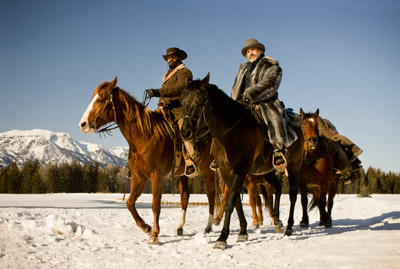 Candyland is the nucleus of a hostile, dysfunctional, powerful operation, run by Calvin Candie. "One of the things that was interesting about the Antebellum South is the fact that when you had slavery you had the equivalent of big corporations today," Quentin Tarantino says. "You had big corporations then, but they would just be families."
Candyland is the nucleus of a hostile, dysfunctional, powerful operation, run by Calvin Candie. "One of the things that was interesting about the Antebellum South is the fact that when you had slavery you had the equivalent of big corporations today," Quentin Tarantino says. "You had big corporations then, but they would just be families." Leonardo DiCaprio took on his first truly villainous role in playing Calvin Candie, Candyland's owner and namesake. "He has a level of commitment and seriousness about his work that I don't think people recognise because he's very quiet, and he's very humble, and he keeps to himself. He is the person who learned as a young man from Robert DeNiro in This Boy's Life. He's the person who cares about the filmmakers that he works with, and he brings his intelligence, and his commitment, and his desire to get you closer and closer to the truth," Stacey Sher says of Leonardo DiCaprio.
"He let me know he was interested in it," Quentin Tarantino says of Leonardo DiCaprio. "I tried not to be that specific with the character in the script, and I tried not to describe him too much, so it could be open for interpretation. But I was thinking, possibly, of an older actor. And then Leonardo DiCaprio read the script and liked it and we got together and started talking."
Leonardo DiCaprio made an impact, and Quentin Tarantino's concept of the character shifted. "I just started imagining how much easier it would be to reconfigure the guy as a Caligula; a boy emperor," Quentin Tarantino says. "His daddy's daddy's daddy started a cotton business and his daddy's daddy continued it and made it profitable, and his daddy made it even more profitable. Now, he's the fourth Candie in line to take over the cotton business and he's bored with it. He doesn't care about cotton: that's why he's into the Mandingo fighters. But he's the petulant boy prince. He's Louis XIV in Versailles. So I wanted to really play with that idea, of King Louis XIV, but in the South. Candyland is a completely enclosed community, about 65 miles long. That's a fiefdom. He has the power of a king; he can execute people, or do whatever he wants."
"One of the most vile aspects of his character is that he's just got this charm, and yet he doesn't really think he's doing anything wrong," James Remar says of Candie's rationale. "He's this guy that's got too much money, too much power, too much time on his hands, and he can run people's lives. He's a Caligula. He's quite mad, but he justifies all of it. People aren't gonna like him. But they'll respect his work. I mean I'm watching it and I'm very drawn in. He is very precise. He pays a great deal of attention to detail."
Walt Goggins, who plays Billy Crash, comments on the complexity of Candyland's hierarchy: "He's a part of sustaining this plantation system, because Billy Crash has it pretty good. Billy Crash and Stephen have a real understanding that we have to keep this gravy train going because we're getting paid, and life's pretty good for us at Candyland."
Samuel L. Jackson's Stephen has perhaps the most complicated relationship with Candie. "Once we started doing table readings in Los Angeles I discovered where I wanted to go with him, who he was, and what I wanted him to be," Samuel L. Jackson explains of Stephen. "It's an interesting relationship between Leonardo DiCaprio and I that works out very well in terms of Django's relationship to Dr. Schultz. Their relationship is almost shadowed by our relationship."
"I was here since his father was here, and probably spent a lot of time with him as a child and kind of raised him. I'm almost like the father that's gone," Jackson says. "We have another relationship in private than the one we have in public. Leo's characterization is awesome, and when we're alone he becomes the child that I used to take care of, and teach things, and talk to, and have a sterner relationship with in terms of making him get in line and understanding what's going on."
Jackson worked with makeup artists Allan Apone and Jake Garber to design Stephen's aged, weathered appearance. "Thank goodness Quentin Tarantino hung in there with us and waited until we got it exactly right," Samuel L. Jackson says. "We did about seven, eight makeup tests until we got to this particular place."
Even though Christoph Waltz and Cayouette had collaborated with Quentin Tarantino previously, all relationships paled in comparison to Quentin Tarantino's rapport with Samuel L. Jackson. "Quentin Tarantino and Samuel L. Jackson's relationship makes you jealous, like, 'Wow, man. Them dudes know each other.'" Jamie Foxx jokes. "And I look forward to having that type of relationship with Quentin here on out. They know each other, they've got each other's back, they figure things out. They came up with nifty stuff that I think that wasn't even in the script, but that enhanced everything. Samuel Jackson was a true juggernaut."
Django Unchained also allowed Samuel L. Jackson to re-team with Kerry Washington, his co-star from Mother and Child and Lakeview Terrace. "I'm always glad to be in a creative space with Kerry. She has this very soft, and gentle, and beautiful nature that is filled with fragility that covers this strong thing that she has inside her. I just really like interacting with her. Every time we get together something special happens." Samuel L. Jackson says.
"She was the one who we all cared about the most," Jamie Foxx adds. "If you talked to Quentin Tarantino and Leonardo DiCaprio and everybody, we wanted to make sure she was good because she had to go through hell. And to watch her go through hell every day, it was tough."
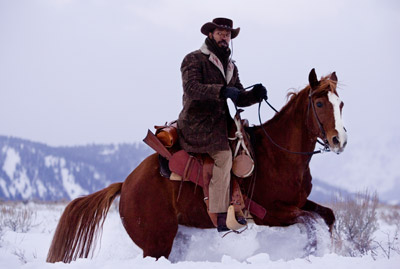 Broomhilda's second language provided a welcome distraction for Washington. "Learning German was actually really helpful for me," Kerry Washington recalls. "Once the role was offered to me I became paralyzed with fear because I had a sense of how difficult the role was going to be for me emotionally. I didn't know how to enter into it. I was concerned for myself in the process because I could just feel how raw her world was. The German lessons, and wrapping my head around the German helped me to hook into Broomhilda in ways that were not emotionally overwhelming at first. Developing that part of her helped me approach the character without feeling like I was going to suffocate from the sorrow of it."
Broomhilda's second language provided a welcome distraction for Washington. "Learning German was actually really helpful for me," Kerry Washington recalls. "Once the role was offered to me I became paralyzed with fear because I had a sense of how difficult the role was going to be for me emotionally. I didn't know how to enter into it. I was concerned for myself in the process because I could just feel how raw her world was. The German lessons, and wrapping my head around the German helped me to hook into Broomhilda in ways that were not emotionally overwhelming at first. Developing that part of her helped me approach the character without feeling like I was going to suffocate from the sorrow of it." Laura Cayouette plays Lara Lee, Candie's sister. "I think her part in Candyland, and also in this movie is to sort of bring a bit of lace to this very brutal, brutal world," Laura Cayouette says. "In a larger sense, I think she represents the old South. I think she represents the thing that, that men went off to war to fight for, and, and the ridiculousness and beauty of what it takes to dress like that, and you know, have your hair done that way."
"The first time we see her, she has a little bit of a Blanche Dubois kind of thing. She pulls it off. Her next change, she comes down like Queen Elizabeth. The tiara, and you know, royal colours. Her whole life is probably putting on clothes. She's not married anymore, she's head of household. The family's rich, so she's always themed," costume designer Sharen Davis says.
Dennis Christopher, who plays Moguy, found that the production offered him an unexpected chance to study the realities of slavery. "Slavery was not just a little blip in history. It's something that built this country, and the cruelty that it embodies is something that we really have to look at. I did a lot of research before I came down here, and one of the things that I walk away with is how little I really learned about it in school. And you can never know the depths of evil that a man can sink to unless you talk about it, unless you start the conversation, unless you illustrate it."
James Remar returned to the production, this time portraying Butch Pooch, Candie's bodyguard. "I'm not a Southerner, I'm a very professional bodyguard, not really involved with the whole symbiosis of Candyland. I have one job, and that's to protect Calvin Candie," James Remar says.
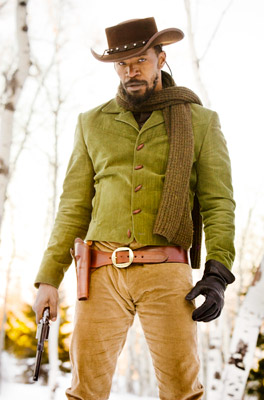 The production made one last trip to the Los Angeles area to wrap on July 24, 2012. "It's been such an adventure," Washington says. "We're in Wyoming one week, and the next week we're in Louisiana, and then we're in Los Angeles. We're all over the place in the same way that this character is trekking across the United States to find his wife. I think the adventure of making the film, and the adventure that Django goes on, are epic journeys in the name of love, which I think is pretty awesome."
The production made one last trip to the Los Angeles area to wrap on July 24, 2012. "It's been such an adventure," Washington says. "We're in Wyoming one week, and the next week we're in Louisiana, and then we're in Los Angeles. We're all over the place in the same way that this character is trekking across the United States to find his wife. I think the adventure of making the film, and the adventure that Django goes on, are epic journeys in the name of love, which I think is pretty awesome." MORE
- Mission: Impossible Fallout
- Glenn Close The Wife
- Allison Chhorn Stanley's Mouth Interview
- Benicio Del Toro Sicario: Day of the Soldado
- Dame Judi Dench Tea With The Dames
- Sandra Bullock Ocean's 8
- Chris Pratt Jurassic World: Fallen Kingdom
- Claudia Sangiorgi Dalimore and Michelle Grace...
- Rachel McAdams Disobedience Interview
- Sebastián Lelio and Alessandro Nivola...
- Perri Cummings Trench Interview



